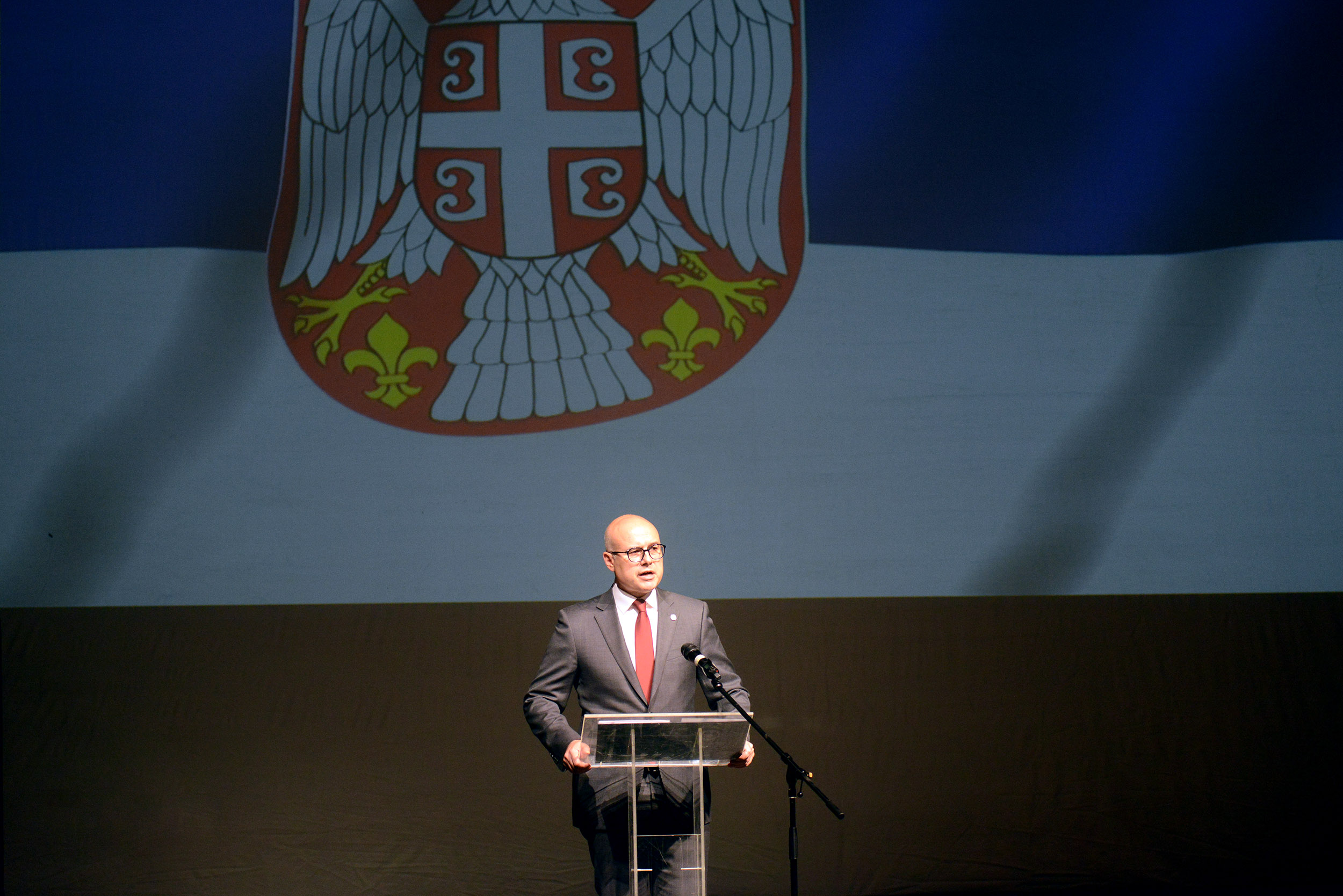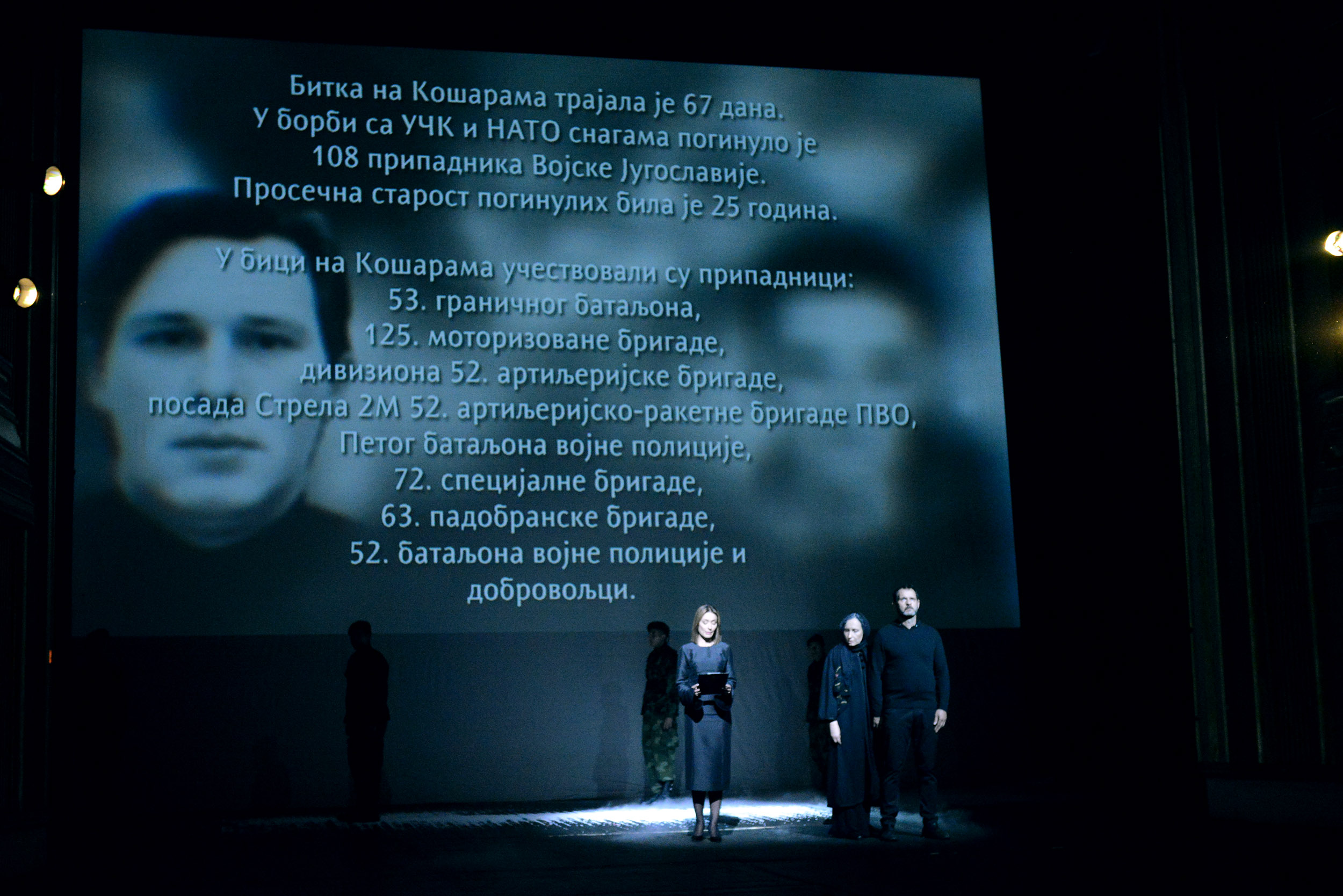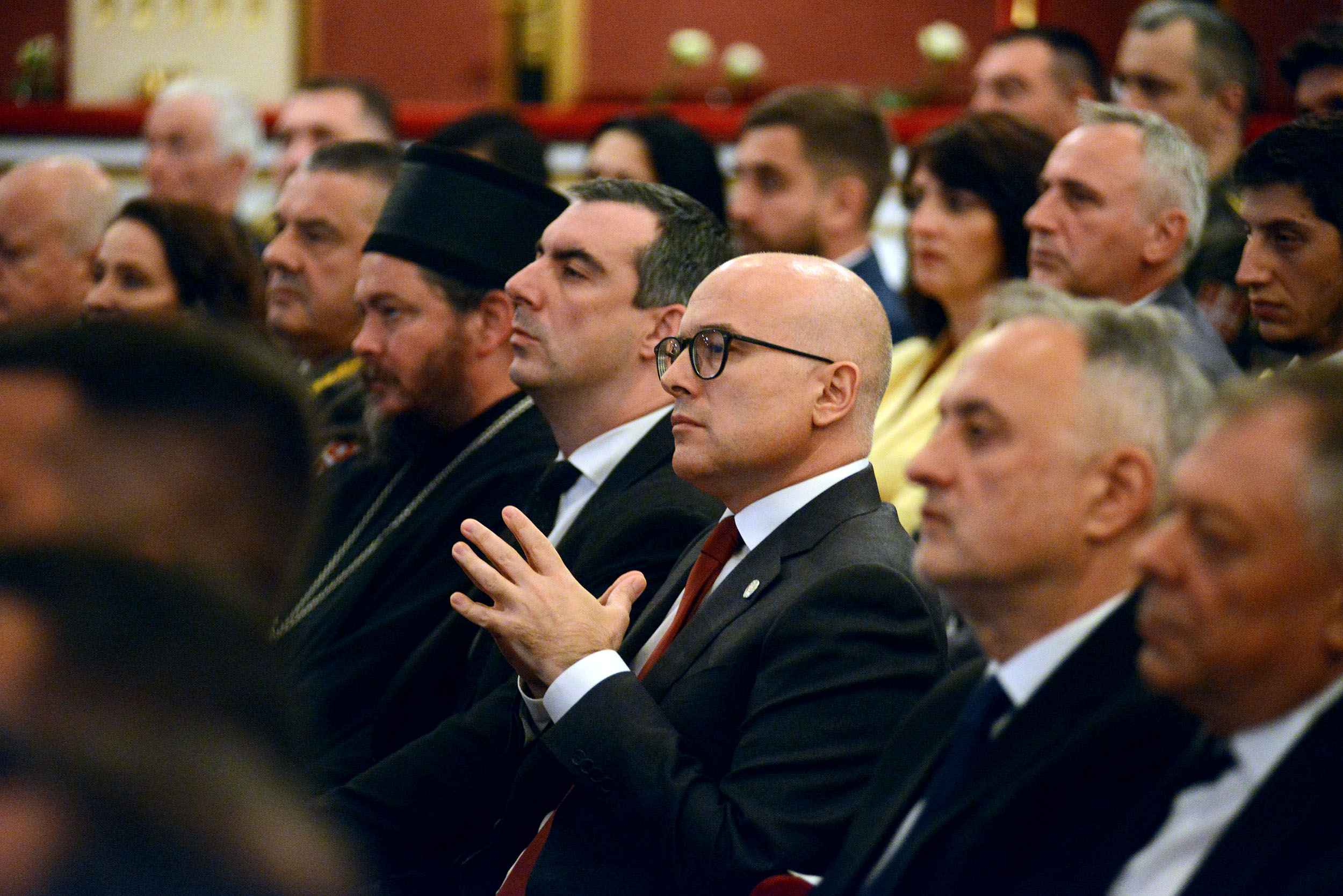14.06.2023.
Minister Vučević attends commemorative event to mark 24th anniversary of Battle of Košare
Acting as a representative of the President of the Republic and Supreme Commander of the Serbian Armed Forces, Deputy Prime Minister and Minister of Defence Miloš Vučević attended tonight a memorial event to mark the 24th anniversary of the Battle of Košare at the National Theatre in Belgrade.
 In his address to the audience, Minister Vučević said that students attending legal and political theory classes at universities all over the world are taught that, ever since 1945 until the present day, the international legal order has been resting on the foundation of the United Nations Charter, this theory boiling down to the fact that the member states of the United Nations are prohibited from using war to resolve conflicts, except for self-defence in the case of an armed attack or if the UN Security Council so decides, and that all nations, UN member states, must meet this obligation.
In his address to the audience, Minister Vučević said that students attending legal and political theory classes at universities all over the world are taught that, ever since 1945 until the present day, the international legal order has been resting on the foundation of the United Nations Charter, this theory boiling down to the fact that the member states of the United Nations are prohibited from using war to resolve conflicts, except for self-defence in the case of an armed attack or if the UN Security Council so decides, and that all nations, UN member states, must meet this obligation.- The Federal Republic of Yugoslavia did not attack NATO in 1999, nor did it commit aggression against any UN member state, so in that context, starting a war against our country based on the principle of self-defence has no legal foundation. It is also well known that Yugoslavia was attacked without the consent of the UN Security Council. Ever since then, there has been no international public order, there has only been arbitrariness and force, which pose the greatest threat to world peace today. The theses that the issue of Kosovo and Metohija is unique and peculiar and that the principles applied here cannot be applied anywhere else – are simply not true - said the Minister of Defence.
 According to him, the moment we start abandoning the rule of law and start letting someone else, someone more powerful, judge when the use of force is acceptable and when it is better to stick to the law, all based on current interests, the legal order ceases to exist as a fundamental prerequisite for justice itself.
According to him, the moment we start abandoning the rule of law and start letting someone else, someone more powerful, judge when the use of force is acceptable and when it is better to stick to the law, all based on current interests, the legal order ceases to exist as a fundamental prerequisite for justice itself.- To quote Montesquieu, “An injustice to one is a threat made to all”. The creators of our misfortune at the time will not see the simple truth - that the international public law was violated in the case of the Federal Republic of Yugoslavia in 1999 and that the principles of international public order must be adhered to always and everywhere, and not selectively when it suits certain powers - said Minister Vučević.
Speaking about 1999, the Minister of Defence highlighted that international injustice had fallen upon our fatherland in a frenzied rage, in an effort to prove its superiority and supremacy.
 - In the most unjust war ever waged, this military alliance failed to defeat the Yugoslav Army, which heroically defended our homeland. Nineteen most powerful countries attacked our country and our people with all their combat power. Civilians and civilian facilities were declared legitimate targets, and innocent victims were declared collateral damage - a term that monstrously scorns the suffering and deaths of the innocent. That expression represents heartlessness and a moral stain on the faces of the countries that took part in that aggression - Minister Vučević said.
- In the most unjust war ever waged, this military alliance failed to defeat the Yugoslav Army, which heroically defended our homeland. Nineteen most powerful countries attacked our country and our people with all their combat power. Civilians and civilian facilities were declared legitimate targets, and innocent victims were declared collateral damage - a term that monstrously scorns the suffering and deaths of the innocent. That expression represents heartlessness and a moral stain on the faces of the countries that took part in that aggression - Minister Vučević said.When it became clear that our people and their spirit could not be broken, Minister Vučević said, a crucial hostile act began, which had been prepared and carried out with the aim of "bringing our country to its knees" by means of ground invasion.
- That attack, which was the tip of the spear that was supposed to pierce through the heart of our crucified land, was directed at Košare. After the golgotha and suffering, after the destruction and all that we endured, our fate was to end and our army was to be defeated there. Everyone who believes in God knows about the old story of David and Goliath. If we take a look at our famous battles throughout history, we can see that this story and this struggle are in our bones. That a smaller, weaker opponent does not give in to a bigger, stronger adversary and that in the end, with God's help, they defeat the enemy. Like once before – in 1389, the Serbian knights moved into position there, in Košare, creating a rampart between the enemy and free Serbia with their very lives - said the Minister of Defence.
 According to the Minister of Defence, even today, the creators of the 1999 aggression do not understand how our army managed to fight off that attack.
According to the Minister of Defence, even today, the creators of the 1999 aggression do not understand how our army managed to fight off that attack.- There is no rational answer. Nobody understands why they did not back down, run away, surrender. The only reason, and we ask them to understand it because it will help them understand the soul of our people, is that those knights were defending Kosovo and Metohija. They were defending their parents, their brothers and sisters, children and wives. They were defending their descendants and ancestors, knowing that only Serbia was behind them. And they remained there, all 108 of them, to stand heavenly guard. To testify and remember, to remind us, to curse those who dared to forget them and be ashamed of them. And to bless before God those who will never forget them or you, who are here with us today and elsewhere on the globe, and who defended Serbia’s life together with them - said Minister Vučević.
The Minister of Defence said that it was his honour to address the audience at the event commemorating the heroic deeds of the heroes of Košare.
 - Today I have a difficult task and at the same time a great honour and responsibility to take the stage and address you on behalf of the President of the Republic of Serbia Aleksandar Vučić. Sometimes it is very hard to find the right words, and in those moments, silence sends the most powerful messages. When I look at the audience, the silence coming from 108 seats in this hall is perhaps the loudest and the most powerful message that, I believe, any of us has ever heard. In that silence, we can hear loud and clear their scream, pride, defiance, and at the same time we can feel sadness. Sadness that those once young, smooth-cheeked boys are not with us today to stand proudly on this stage and receive praise and decorations for outstanding service and defence of the motherland, and for showing us, in the most difficult times, what courage and heroism mean and how strong the will and readiness to defend what is yours can defeat even the most powerful forces in the world - said Minister Vučević.
- Today I have a difficult task and at the same time a great honour and responsibility to take the stage and address you on behalf of the President of the Republic of Serbia Aleksandar Vučić. Sometimes it is very hard to find the right words, and in those moments, silence sends the most powerful messages. When I look at the audience, the silence coming from 108 seats in this hall is perhaps the loudest and the most powerful message that, I believe, any of us has ever heard. In that silence, we can hear loud and clear their scream, pride, defiance, and at the same time we can feel sadness. Sadness that those once young, smooth-cheeked boys are not with us today to stand proudly on this stage and receive praise and decorations for outstanding service and defence of the motherland, and for showing us, in the most difficult times, what courage and heroism mean and how strong the will and readiness to defend what is yours can defeat even the most powerful forces in the world - said Minister Vučević.According to him, the heroes of Košare have moved to eternity and textbooks, but we still pray that this kind of affliction never happens to anyone again.
 - Only a nation that is aware of its suffering, a nation that has a culture of remembrance and reverence for the victims and their families can ensure the future we strive for - a safe, strong, stable and powerful Serbia – our homeland. We owe such a Serbia to them. To those who are no more, whose families will light candles and remember their loved ones in their prayers for as long as they live. We owe it to our children, too. We owe them the peace and prosperity we are fighting for, the childhood, and peaceful dreams. That is why we will not and must not stop, and we must not back down from our fight for Serbia, just as the heroes from Košare did not back down - said the Minister of Defence.
- Only a nation that is aware of its suffering, a nation that has a culture of remembrance and reverence for the victims and their families can ensure the future we strive for - a safe, strong, stable and powerful Serbia – our homeland. We owe such a Serbia to them. To those who are no more, whose families will light candles and remember their loved ones in their prayers for as long as they live. We owe it to our children, too. We owe them the peace and prosperity we are fighting for, the childhood, and peaceful dreams. That is why we will not and must not stop, and we must not back down from our fight for Serbia, just as the heroes from Košare did not back down - said the Minister of Defence.On behalf of the Košare fighters, Second Lieutenant Petar Mišić (retd) addressed the audience. The man was seriously wounded on April 9, 1999, while carrying out a combat mission at the Košare outpost, losing his right leg. Second Lieutenant Mišić said that today, after 24 years, it can be said that the Serbian people and the Serbian army came out of that war holding their heads high.
- On behalf of the 108 fallen heroes, whose empty seats we can see here, and all the fighters who have survived, I would like to thank you for correcting the injustice and for establishing, in 2019, June 14 as the day commemorating the end of the battle at the Košare border outpost. I am grateful that the Battle of Košare has been included in history textbooks for 8th-graders and that children learn about the heroes and their defence of the homeland. We know that after Košare, other battles fought by the Serbian people will also enter the textbooks - said the Košare fighter, adding that the sadness for the fallen comrades is constantly felt.
 Speaking on behalf of the families of the fallen Košare fighters, Životije Milićević, the father of Dragan Milićević, a fallen soldier known as Šumar (Forester), said that the pain in his heart would never go away or heal.
Speaking on behalf of the families of the fallen Košare fighters, Životije Milićević, the father of Dragan Milićević, a fallen soldier known as Šumar (Forester), said that the pain in his heart would never go away or heal.- As I look at those empty chairs, I can't help but admit that besides immense sadness and pain, I feel immense pride that one of those chairs belongs to my Dragan. He and his comrades-in-arms, Serbia’s youth, the smooth-cheeked boys, left their stamp on the history of our holy land and were special in their bravery, heroism, and the destiny that God had pre-planned for them. They were chosen. They served their country and left us a task to protect every inch of that land, too - said the father of the fallen Košare fighter.
 The Battle of Košare began on April 9, 1999, when members of the terrorist KLA, aided by NATO air force, attempted to carry out a ground invasion of Kosovo and Metohija by attacking the outpost on the Yugoslav-Albanian border in the Junik Mountains. The fighting at the Košare border outpost lasted for 67 days, until June 14, 1999, when the Yugoslav Army withdrew from Kosovo and Metohija, following the signing of the Kumanovo Agreement.
The Battle of Košare began on April 9, 1999, when members of the terrorist KLA, aided by NATO air force, attempted to carry out a ground invasion of Kosovo and Metohija by attacking the outpost on the Yugoslav-Albanian border in the Junik Mountains. The fighting at the Košare border outpost lasted for 67 days, until June 14, 1999, when the Yugoslav Army withdrew from Kosovo and Metohija, following the signing of the Kumanovo Agreement.



